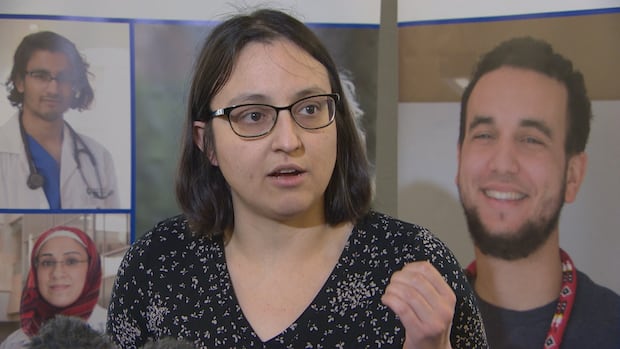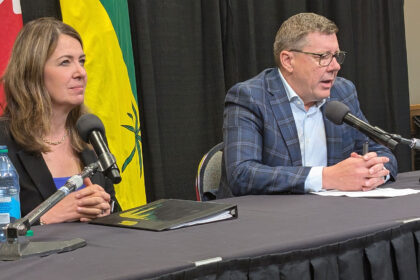SaskatchewanDr. Karissa Brabant, who works with homeless people and those suffering from addictions at a clinic in Moose Jaw, says forced treatment will fail and waste money.Doctors confront health minister at Saskatchewan Medical Association eventPhil Tank · CBC News · Posted: Oct 24, 2025 4:26 PM EDT | Last Updated: 4 hours agoListen to this articleEstimated 4 minutesDr. Karissa Brabant, who works at a clinic in Moose Jaw, speaks to reporters Friday during the Saskatchewan Medical Association’s fall assembly in Saskatoon. (Chanss Lagaden/CBC)A Moose Jaw physician says the Saskatchewan government should not enact a law that could force people suffering from addictions into treatment.Dr. Karissa Brabant read out a Facebook post from Premier Scott Moe announcing the Compassionate Intervention Act at a session during the Saskatchewan Medical Association’s fall assembly Friday in Saskatoon.“Bullshit,” the Moose Jaw doctor said while asking a question of Health Minister Jeremy Cockrill. “This is absolute garbage. The reason this is garbage is because the very central tenet of ethics in medicine is patient autonomy, the ability of a patient to choose what happens to them.”Brabant, who works with homeless people and those suffering from addictions at a clinic in Moose Jaw, said forced treatment will fail and waste money. Many of the hundreds of delegates attending the event applauded her short speech.Cockrill replied that the province’s main focus is on recovery achieved through voluntary treatment. He said those needing forced treatment represent “a very, very small subset of the population.”Cockrill repeated Moe’s assertion that forced treatment would apply to people who pose harm to themselves or others.He told reporters later Friday that his conversations with other health ministers have revealed that every province is struggling with how to tackle addiction treatment. British Columbia has backtracked to include the possibility of involuntary care, Cockrill said.The government is still listening to “addiction experts” on its approach, he said.“What we’ve heard from Saskatchewan people, what we’ve heard from Saskatchewan families is that they want more avenues for their family members to get into recovery, to get into treatment,” Cockrill said.Cockrill said the government has heard from “several” physicians who support involuntary addiction treatment. Saskatchewan Health Minister Jeremy Cockrill says the government is listening to what experts say about addictions treatment. (Chanss Lagaden/CBC)But Brabant said success in treating addiction requires someone who is willing to seek care.Patient autonomy is enshrined in the Canada Health Act, she added.“Nobody can force anybody to undergo treatment that they do not believe in or do not want,��” she told reporters.Brabant dismissed Cockrill’s explanation that involuntary treatment would apply only to very few people.“If it’s directed at one person, that’s too many,” she said. “The reality is that if you have one person whose rights to autonomy, their right to choose their treatment, is violated, it opens the door as precedent to do it to more people.”WATCH | Sask. health minister blasted with strong language over involuntary treatment:Sask. health minister blasted with strong language from doctor over involuntary treatmentDr. Karissa Brabant condemned the province’s involuntary treatment plan while speaking to Health Minister Jeremy Cockrill at a medical conference in Saskatoon.Brabant further described her reaction to Moe’s Facebook post on involuntary care.She said the post came from a “place of ignorance” and a lack of understanding about the complexity of treating addiction.Dr. Sean Groves, who works as a family doctor in La Ronge, also questioned the government’s philosophy on addiction treatment.He said the clinic he works at has recorded 20 to 25 new HIV cases over the last couple of years after a decade of stability. He estimates lifetime treatment for those cases will cost about $28 million.Groves told Cockrill that he sees a connection between the new HIV cases and the government’s move away from harm reduction and a resulting lack of clean needles and pipes.He further questioned stigmatizing needle use with the government’s decision to classify needles as weapons.Cockrill acknowledged that addictions are “complex,” but he added that Saskatchewan people want their tax dollars used responsibly.“Drug use should not be an easy choice,” he said. “We want recovery to be the easiest choice in this province that people can find their way through that.” LISTEN | Cross Country Checkup delves into involuntary addiction treatment:Cross Country Checkup1:52:58Involuntary Addiction Treatment: What you need to know.Since 2016, more than 50,000 Canadians have died from toxic drug poisoning. That’s roughly the population of Woodstock, Ontario or Penticton, BC. In May, Alberta passed the “Compassionate Care Act”, a new law giving police, family members, and doctors the right to request mandatory addiction treatment for those deemed a danger to themselves or others. B.C. recently announced an expansion in its involuntary care program while other provinces are considering it. Supporters call it a last resort for those who can’t help themselves. Critics warn it’s a dangerous overreach with serious ethical risks. Our question: Is involuntary treatment for addiction ever justified? When – if ever – should it be mandatory?
‘Absolute garbage’: Sask. physician blasts plans to add involuntary addictions treatment











